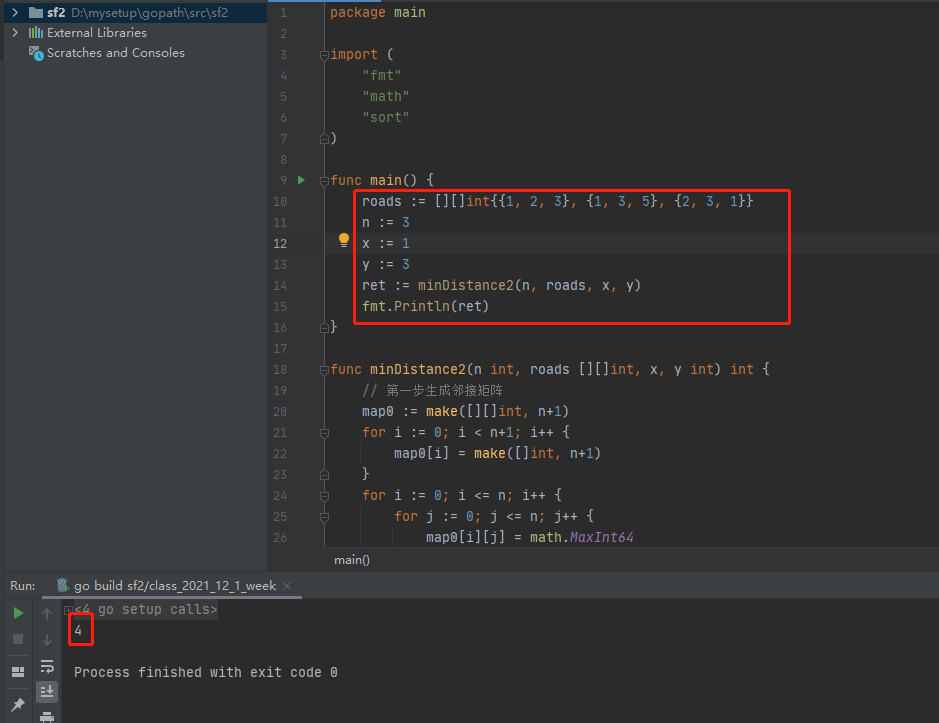2022-03-11:int n, int[][] roads, int x, int y, n表示城市数量,城市编号0~n-1, roads[i][j] == distance,表示城市i到城市j距离为distance(无向图), 求城市x到城市y的最短距离。
答案2022-03-11:
有向图,没有负数环。小根堆。
代码用golang编写。代码如下:
package main
import (
"fmt"
"math"
"sort"
)
func main() {
roads := [][]int{{1, 2, 3}, {1, 3, 5}, {2, 3, 1}}
n := 3
x := 1
y := 3
ret := minDistance2(n, roads, x, y)
fmt.Println(ret)
}
func minDistance2(n int, roads [][]int, x, y int) int {
// 第一步生成邻接矩阵
map0 := make([][]int, n+1)
for i := 0; i < n+1; i++ {
map0[i] = make([]int, n+1)
}
for i := 0; i <= n; i++ {
for j := 0; j <= n; j++ {
map0[i][j] = math.MaxInt64
}
}
// 建立路!
for _, road := range roads {
map0[road[0]][road[1]] = getMin(map0[road[0]][road[1]], road[2])
map0[road[1]][road[0]] = getMin(map0[road[1]][road[0]], road[2])
}
// computed[i] = true,表示从源出发点到i这个城市,已经计算出最短距离了
// computed[i] = false,表示从源出发点到i这个城市,还没有计算出最短距离
computed := make([]bool, n+1)
// 距离小根堆
//PriorityQueue<Node> heap = new PriorityQueue<>((a, b) -> (a.pathSum - b.pathSum));
heap0 := make([]*Node, 0)
heap0 = append(heap0, NewNode(x, 0))
for len(heap0) > 0 {
// x -> ... -> 当前的城市, 有距离
sort.Slice(heap0, func(i, j int) bool {
a := heap0[i]
b := heap0[j]
return a.pathSum < b.pathSum
})
cur := heap0[0]
heap0 = heap0[1:]
if computed[cur.city] {
continue
}
// 没算过
// 开始算!
if cur.city == y {
return cur.pathSum
}
computed[cur.city] = true
for next := 1; next <= n; next++ {
if next != cur.city && map0[cur.city][next] != math.MaxInt64 && !computed[next] {
heap0 = append(heap0, NewNode(next, cur.pathSum+map0[cur.city][next]))
}
}
}
return math.MaxInt64
}
func getMin(a, b int) int {
if a < b {
return a
} else {
return b
}
}
// 当前来到的Node,注意这不是城市的意思,这是就是一个普通的封装类
// Node封装了,当前来到的城市是什么,以及,从源出发点到这个城市的路径和是多少?
type Node struct {
// 当前来到的城市编号
city int
// 从源出发点到这个城市的路径和
pathSum int
}
func NewNode(c, p int) *Node {
ans := &Node{}
ans.city = c
ans.pathSum = p
return ans
}
执行结果如下:







 京公网安备 11010502036488号
京公网安备 11010502036488号